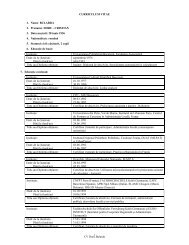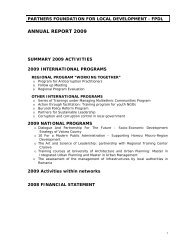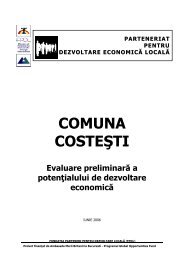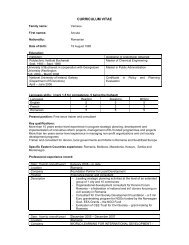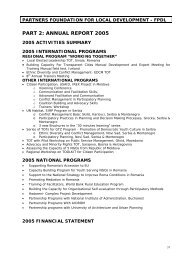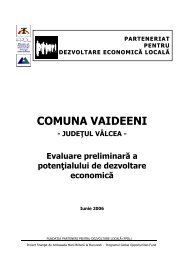Organizational Development: A Manual for Managers and ... - FPDL
Organizational Development: A Manual for Managers and ... - FPDL
Organizational Development: A Manual for Managers and ... - FPDL
You also want an ePaper? Increase the reach of your titles
YUMPU automatically turns print PDFs into web optimized ePapers that Google loves.
most participants probably already underst<strong>and</strong>, be<strong>for</strong>e those who do not underst<strong>and</strong> would ask<br />
to do so. Of course, they should be encouraged to ask. Then dissatisfaction of those, who are<br />
<strong>for</strong>ced to listen well known things will be less, <strong>and</strong> not directed to the trainer.<br />
However, the main challenge is making any statements. Any statements should come to<br />
participants’ heads at least a second be<strong>for</strong>e trainer will say it. Alternatively, these statements<br />
should just reflect participants’ experience, which should immediately proof the idea expressed<br />
by the trainer. For example, be<strong>for</strong>e saying that positive <strong>and</strong> negative emotions are necessarily<br />
balanced in human being, trainer should ask participants if they could enjoy drinking water when<br />
they are not thirsty. Starting courses on Personnel Management, we challenge trainees with the<br />
statement: ‘There are no people in the world, who would like to work badly'. It is just not<br />
pleasant. No one can enjoy his actions without positive feedback, that they are successful.<br />
Everyone seeks <strong>for</strong> respect if not from others, then at least from himself. We have never meet<br />
people who would be happy doing something badly <strong>and</strong> underst<strong>and</strong>ing that they do it badly.<br />
Have you ever met them? [No…] Nevertheless, you have probably met some that works badly,<br />
haven’t you? [Yes!]. Why do you think they work badly if they obviously [already…] do not like<br />
it? Do you agree that people should not be blamed <strong>for</strong> what they do against their willingness?<br />
Who should be responsible then?’ [Now each trainee is thinking not about bad workers, but<br />
about himself or his boss… <strong>and</strong> they are ready to learn more about this.]<br />
Very often trainees enjoy interesting lectures <strong>and</strong> they are ready to spend all the time <strong>for</strong> this<br />
entertainment. But trainer should not <strong>for</strong>get, that real changes in trainees’ mentality <strong>and</strong> skills<br />
will happen not so much when listening trainer, as when doing hard intellectual work on<br />
applying new ideas (or well <strong>for</strong>gotten old ideas) in exercises very relevant to their real practice.<br />
To give them such opportunity through the questionnaires, groups’ exercises, <strong>and</strong> discussions<br />
is much more important, than to demonstrate the erudition of lecturer.<br />
9.3 DEMONSTRATIONS. The audience at training courses <strong>for</strong> local officials is usually very<br />
different from the audience at a church or university classroom. Officials are often suspicious to<br />
any sentences <strong>and</strong> statements, which require changing mental maps <strong>and</strong> consequently<br />
behavioural patterns. They would often feel <strong>and</strong> sometime express resistance to the ideas<br />
declared by trainer. They may start to argue <strong>and</strong> destroy the presentation. That is why<br />
demonstration may provide extremely valuable support to the trainer.<br />
Demonstration means giving the fact, which trainees cannot deny. For example, trainer could<br />
ask one part of the group to ask, in pairs, two kinds of questions from the colleagues, who<br />
belong to another part, which was not instructed. When getting answers, ‘interviewers’ should<br />
indicate the first move of the respondents’ eyes. After reporting results, it became clear to all<br />
groups that this movement depends from the kind of intellectual activity of respondent – if he<br />
just recalls the fact or designs the story. Trainer said nothing about this. It was demonstrated.<br />
208



